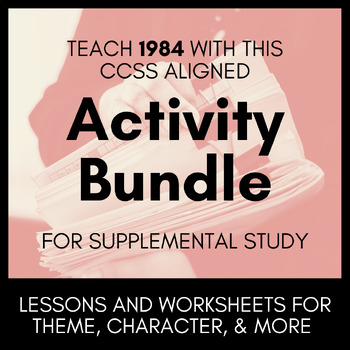Supplemental Novel Study Materials and Resources for 1984 by George Orwell
- Zip

Products in this Bundle (8)
showing 1-5 of 8 products
Also included in
- Planning a novel study is hard. Make your life easier with this flexible, engaging, and standards-based unit plan for George Orwell's classic dystopian novel, 1984. This complete novel study walk your students through the entire book in 6-7 weeks. Along the way, you'll be provided with all the toolsPrice $30.00Original Price $39.00Save $9.00
Description
Enhance and expand your 1984 novel study with these high-quality supplemental materials for George Orwell's classic book. Whether you want to add character analysis activities to your unit, a student-led Socratic Seminar, or simply need a fresh way to introduce the novel, this bundle has you covered. In total, this collection has nearly two weeks worth of materials and resources (including teacher guides and lesson plans) that you can use to engage your students in a meaningful way.
THIS BUNDLE INCLUDES
Dystopian Literature Introductory Slideshow:
1) An engaging, editable slideshow that teaches:
- The difference between utopias and dystopias
- Popular dystopian novels
- Common elements in dystopian literature
- Common themes in dystopian literature
- Characteristics of dystopian protagonists
- Why dystopian literature matters
Instagram Themed George Orwell Research Activity:
1) Teacher tips and tricks for ways to enhance engagement and offer differentiation to your students
2) A highly engaging, Instagram themed worksheet that guides students as they research various aspects of the life and work of George Orwell, including:
- His genre, style, and works
- Important facts and accomplishments about him
- His birthplace and hometown
- Important literary figures he had connections to
- Significant events in his life
- Some of his most famous quotes
1984 First Line and Title Analysis Worksheet:
1) Clear instructions and an engaging design to support and hook students
2) A print-or-post PDF copy of the 1984 worksheet with higher-level, guided questions to help students analyze and make inferences about this dystopian classic
3) A cover analysis extension activity to help students dig deeper and support differentiation
Character Motivation Discussions:
1) A lesson plan with teaching notes that can be used for three lessons
2) A double-sided student worksheet with twelve discussion questions
3) A simple, effective rubric for easy grading
A Hexagonal Thinking Lesson Activity:
1) A lesson outline and teaching notes
2) One set of printable, character-based hexagons
3) One blank set of hexagons to extend the activity
4) A reflection paragraph worksheet (with sentence stems)
A First Impression Worksheet on Winston Smith:
1) A two-sided student worksheet for comparing their first and last impressions
2) An easy lesson outline (with teacher notes) to increase student engagement
A Take-Home Character Analysis Graphic Organizer:
1) A character analysis note catcher for students to use while reading
2) One page of teacher suggestions and tips
Socratic Seminar Handouts, Prompts, and Rubrics:
1) A two-sided, CCSS aligned handout that includes spaces for:
- Taking notes about the text
- Creating higher-level, probing questions for the seminar
- Accessing sentence frames during the discussion
- Accessing textual analysis questions during the discussion
- Taking notes about the discussion
- Reflection on the discussion
2) Two single-point rubrics for grading
3) Teacher instructions for hosting a Socratic Seminar
Need more dystopia? Try my other resources:
- Distance Learning Novel Study Bundle: The Giver Novel Study, Lois Lowry, CCSS
- All Summer in a Day Activity: A Discussion & Analysis Activity Distance Learning
- Animal Farm Activity: Title Analysis and First Line Analysis Worksheet, CCSS
- Lord of the Flies Activity: Title Analysis and First Line Analysis Worksheet
CLICK HERE TO FOLLOW ME and receive updates about my sales, freebies, and product launches.






